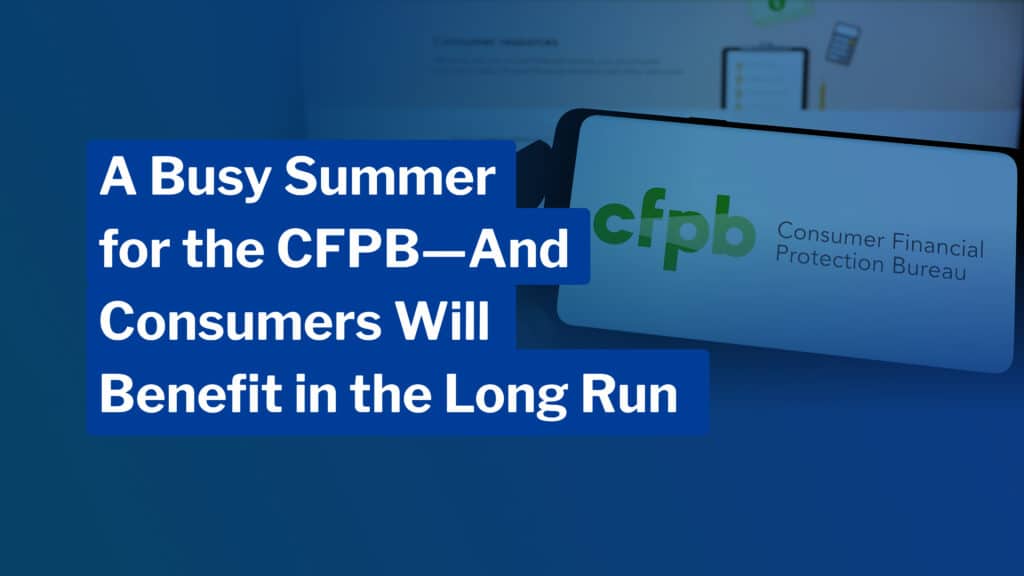It’s already been a busy summer for the Consumer Financial Protection Bureau (CFPB)—Supreme Court rulings, fine print warnings, new registries, and more—all in the continued effort to better protect consumers’ financial health and wellbeing.
Before we dive into the latest CFPB news, let’s have a refresher on what this bureau is and why it is so important:
The Consumer Financial Protection Bureau, or CFPB, was formed in the wake of the 2008 financial crisis, under the Dodd-Frank Wall Street Reform and Consumer Protection Act of 2010, with a mission to implement and enforce federal consumer financial law by holding companies accountable from industries such as payday loans, credit cards, student loans and mortgages.
With this mission in mind, let’s take a closer look at the CFPB news round-up so far this summer and understand its impact for consumers, businesses, and the economic landscape.
Supreme Court Rules and “the CFPB is Here to Stay”
The long awaited United States Supreme Court decision on the CFPB came out May 16, 2024: the CFPB is constitutional.
This constitutionality case was brought by representative groups of the payday loan industry, the Community Financial Services Association of America and the Consumer Service Alliance of Texas, alleging that the CFPB’s funding mechanism is unconstitutional under the Appropriations Clause.
Pundits expected a different outcome from this conservative majority court. In a 7-2 decision, one of the most conservative, Justice Thomas, wrote the majority opinion for an alignment of liberal and conservative Justices (Thomas, Roberts, Sotomayor, Kagan, Kavanaugh, Barrett, and Jackson), stating that the CFPB’s funding mechanism is constitutional since the Bureau draws its budget through the Federal Reserve, rather than an annual appropriation by Congress.
Since the CFPB operates as a consumer watchdog agency funded by the Federal Reserve System, not Congress, the Bureau’s funding mechanism is meant to safeguard the agency’s funding against changes in the political climate, unlike most other federal agencies. Instead, it obtains its funds by making a request to the Federal Reserve, which may not exceed 12% of the Federal Reserve’s “total operating expenses.”
Upon receiving the news, the CFPB issued a statement: “The Court repudiated the arguments of the payday loan lobby and made it clear that the CFPB is here to stay.”
The Fine Print: CFPB Warns About Financial Services Contract Terms
Then on June 4, 2024, fresh off the Supreme Court victory, the CFPB issued a new circular on “unlawful and unenforceable contract terms and conditions in contracts for consumer financial products or services.”
This latest warning now makes it clear that it is a UDAAP (Unfair, Deceptive, or Abusive Acts or Practice) to have an unlawful, unenforceable term in contracts with consumers. These types of consumer contracts can also be perceived as an attempt to confuse people about their rights—such as the general liability waiver, which claims to fully insulate companies from suits even though most states have enacted legal exemptions to these waivers.
When financial institutions enact this fine print tactic to try to trick consumers into believing they have given up certain legal rights or protections, they now risk violating the Consumer Financial Protection Act.
“Federal and state laws ban a host of coercive contract clauses that censor and restrict individual freedoms and rights,” said CFPB Director Rohit Chopra. “The CFPB will take action against companies and individuals that deceptively slip these terms into their fine print.”
This latest warning is part of the CFPB’s broader efforts to “ensure freedom and fairness in people’s interactions with financial institutions.”
CFPB Creates Corporate Offender Registry
In this continued effort, CFPB also finalized a new rule in June to establish a registry to detect and deter corporate offenders that have broken consumer laws and are subject to federal, state, or local government or court orders.
Initially proposed in December 2022, the registry will also help the CFPB to identify repeat offenders and recidivism trends. Historically, nonbank entities faced inconsistent oversight, making it challenging for regulators to identify and address potential risks to consumers. The registry will help the CFPB and other law enforcement agencies monitor and track repeat offenders in order to better hold them accountable if they break the law again.
“Too many American families have been harmed by corporate repeat offenders in a rinse-and-repeat cycle of illegality, where bad actors see fines and penalties as the cost of doing business,” recounts CFPB Director Chopra.
Larger non-bank participants will be among the first block of registrations due January 14, 2025, with other companies under the umbrella having until April 14, 2025, followed by July 14, 2025 to register if they have been caught violating consumer law previously.
A Bureau news release on June 3, 2024 emphasized that “reining in repeat offenders is a priority for the CFPB,” as they introduced not only the new rule and registry, but also the establishment of the new Repeat Offenders Unit.
“In the United States, it is common practice to establish registries of offenders to protect the public and to help prevent repeat offenses,” explains Director Chopra. “The CFPB’s registry will enable the agency to more effectively monitor the marketplace for companies that pose particular risk to consumers.”
Upholding Its Designation as the “Consumer Watchdog”
All of these announcements and actions over the last few weeks prove that the CFPB is still upholding the Bureau’s mission of protecting consumers and ensuring that all Americans are treated fairly by banks, lenders, and other financial institutions. Its reputation as the “Consumer Watchdog” continues to be well-earned as the economic landscape evolves.
Sources:
- https://www.consumerfinance.gov/
- https://www.supremecourt.gov/opinions/23pdf/22-448_o7jp.pdf
- https://www.consumerfinance.gov/about-us/newsroom/statement-on-supreme-court-decision-in-cfpb-v-cfsa/
- https://files.consumerfinance.gov/f/documents/cfpb_circular-2024-03.pdf
- https://www.acainternational.org/news/cfpb-releases-warning-on-financial-services-contract-terms/
- https://www.consumerfinance.gov/rules-policy/final-rules/registry-of-nonbank-covered-persons-subject-to-certain-agency-and-court-orders/
- https://thehill.com/business/4700536-consumer-watchdog-creates-corporate-repeat-offender-registry
